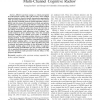Free Online Productivity Tools
i2Speak
i2Symbol
i2OCR
iTex2Img
iWeb2Print
iWeb2Shot
i2Type
iPdf2Split
iPdf2Merge
i2Bopomofo
i2Arabic
i2Style
i2Image
i2PDF
iLatex2Rtf
Sci2ools
142
click to vote
TSP
2010
2010
Sequential and cooperative sensing for multi-channel cognitive radios
Effective spectrum sensing is a critical prerequisite for multi-channel cognitive radio (CR) networks, where multiple spectrum bands are sensed to identify transmission opportunities, while preventing interference to the primary users. The present paper develops sequential spectrum sensing algorithms which explicitly take into account the sensing time overhead, and optimize a performance metric capturing the effective average data rate of CR transmitters. A constrained dynamic programming problem is formulated to obtain the policy that chooses the best time to stop taking measurements and the best set of channels to access for data transmission, while adhering to hard "collision" constraints imposed to protect primary links. Given the associated Lagrange multipliers, the optimal access policy is obtained in closed form, and the subsequent problem reduces to an optimal stopping problem. A basis expansion-based sub-optimal strategy is employed to mitigate the prohibitive comput...
Artificial Intelligence | Optimal Stopping Problem | Sensing | Sequential Sensing Generalizations | TSP 2010 |
Related Content
| Added | 22 May 2011 |
| Updated | 22 May 2011 |
| Type | Journal |
| Year | 2010 |
| Where | TSP |
| Authors | Seung-Jun Kim, Georgios B. Giannakis |
Comments (0)

